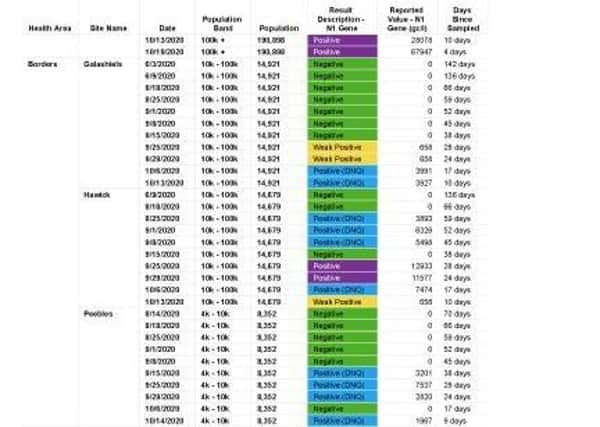Covid-19 fragments found in all Borders waste water sites


In May, SEPA began exploratory work to pinpoint fragments of coronavirus’ ribonucleic acid (RNA) in local waste water samples with the backing of Scottish Government and Public Health Scotland (PHS), alongside Scottish Water, CREW (Centre of expertise for Waters) and academic partners from the University of Edinburgh’s Roslin Institute and Heriot-Watt University.
The latest samples taken in the Borders show that fragments of the virus were still detected at all three sites, although they are classed as “DNQ”, which means while there are positive RNA findings, they are well below the quantifiable limit of 11,386 gene copies per litre.
Advertisement
Hide AdAdvertisement
Hide AdHowever, in Hawick, tests taken on September 25 and 29 showed results of 12,933 and 11,577 respectively, although that site – at 658 on October 10 – is now well under the latest readings at Galashiels (3,927 on 0ctober 13) and Peebles (1,967 on October 14).
While the World Health Organisation has said there is currently no evidence Covid-19 has been transmitted via sewerage systems, the information is being used to help scientists understand the prevalence and distribution of the virus, in conjuction with community testing.
Terry A’Hearn, SEPA chief executive, said: “As Scotland’s environmental watchdog and as a public agency, we remain proud to be playing our part in the national effort to combat coronavirus.
“Our scientific capabilities and expertise in designing and implementing monitoring networks made us ideally suited to delivering this trial and the results we are seeing demonstrate its scientific validity.
Advertisement
Hide AdAdvertisement
Hide Ad“Central to the delivery of this project has been our partnership working with Scottish Water and the University of Edinburgh’s Roslin Institute, and we will continue to work closely together to refine our techniques and understanding.
“We’ve received support from across the public sector, agencies and institutions – including a donation of specialist kit from Science and Advice for Scottish Agriculture – demonstrating how Scotland is coming together to find ways of tackling this virus.”
Of Scotland’s 14 health board areas, only two – Shetland and the Western Isles – being in the clear.
Areas with positive RNA findings are consistent with the areas known to have confirmed Covid-19 cases.
Advertisement
Hide AdAdvertisement
Hide AdTesting is conducted on incoming waste water samples collected by Scottish Water and its operators at 28 public waste water treatment works across the country.
Most locations are tested weekly, but this can be increased when local outbreaks are apparent.
Samples are representative of waste water from between 40-50 percent of the Scottish population and, in combination with community testing, are helping Scotland understand the prevalence and distribution of the virus.
The data is being shared with Public Health Scotland, Scottish Government, the Office for National Statistics and the Joint Biosecurity Centre to assess, and this is now being made publicly available via an online tool at https://informatics.sepa.org.uk/RNAmonitoring/ which will be updated with new data and analyses as they become available.
Advertisement
Hide AdAdvertisement
Hide AdThe Scottish Government’s environment secretary Roseanna Cunningham said: “In order to manage the coronavirus pandemic, it is vital that we continue to develop our understanding of it.
“I welcome this UK-wide programme of research and the development of waste water monitoring to help build our knowledge base.
“Sepa and Scottish Water have translated this experimental programme into a comprehensive, Scotland-wide monitoring network.
“The early data is already providing our public health experts with new information, which complements the wider population testing programme to give a more robust picture of the prevalence of Covid disease in Scotland.
“I look forward to the programme providing further, valuable data over the coming months to support our fight against the pandemic.”